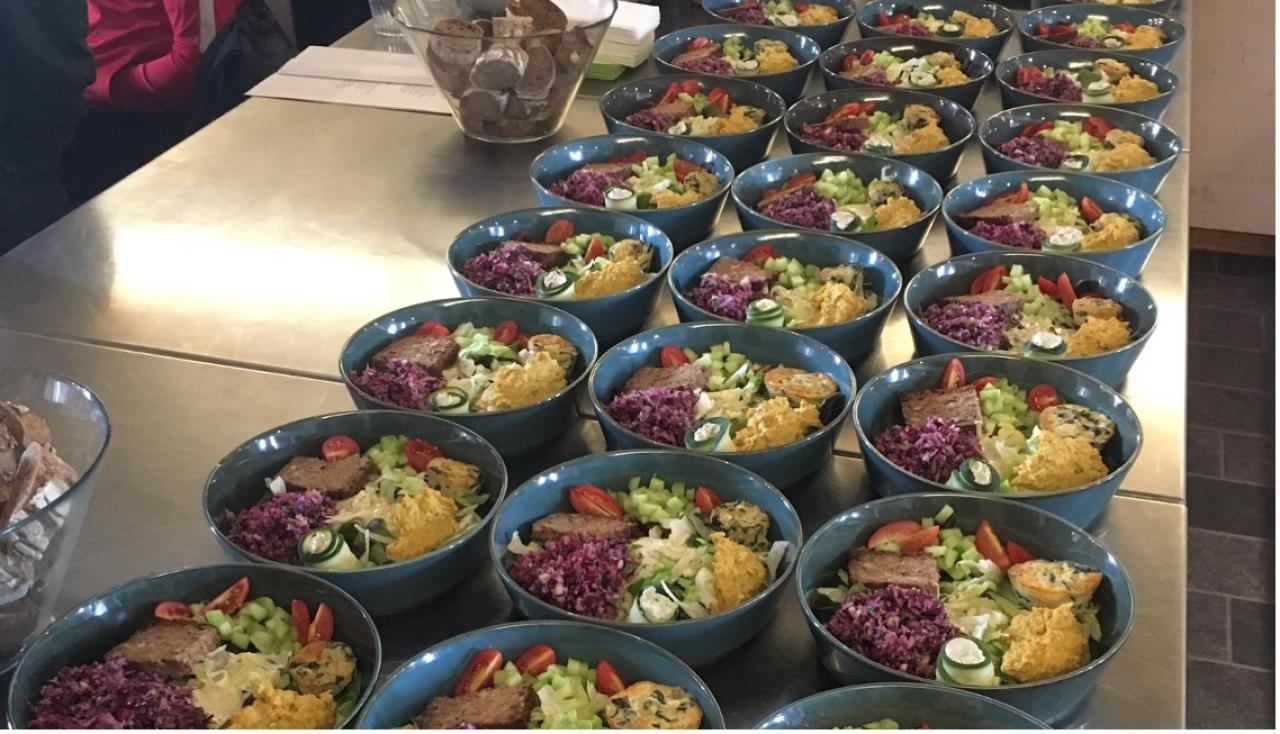Going from 0% to 70% ‘sustainable food’¹ in three years, and more than 50% local: “We're not out of work!” says Davide Arcadipane, from Intercommunale de Soins Spécialisés de Liège (ISoSL). ISoSL is the inter-municipal association providing 4,000 meals per day to more than half of the elementary school canteens in Liège, Belgium.
Since the launch of the URBACT BioCanteens #2 Transfer Network (2021-2022), ISoSL has undertaken a 360° transformation of its practices: adapting menus and integrating organic, local, healthy, fresh and seasonal products, setting up a working dynamic between the cooks and the city’s schools, measuring food waste, developing a mobile meal-ordering application to alleviate administrative work for schools and provide cooks with accurate order numbers, organising visits to producers with the cooks, the purchasing department and the dieticians, modifying six out of nine public food contracts for schools and nurseries, with the objective of 100% local, organic food by 2024.
All of these transformations put together have culminated in a profound change in the ISoSL system. In anticipation of the next EU City Lab, which will take place in Liège, this article explores the city’s integrated food system and, in particular, the role of public procurement in combatting food waste.
A strategy for an integrated food system
At the beginning of 2021, ISoSL decided to take a systemic approach to its collective catering, encompassing four main areas of work: purchasing policy, production management, waste reduction and awareness of sustainable food.
A lot more could be written on each aspect of this approach, and the Liège food ecosystem as a whole. For the purpose of this article, it is worth examining a few prompts for the strategy: How can the city change the way it buys so that sustainable products enter the kitchens? What constitutes a purchasing strategy that is consistent with the values of sustainable food? How can ISoSL’s purchasing power be leveraged to invest in local, sustainable and resilient food systems?
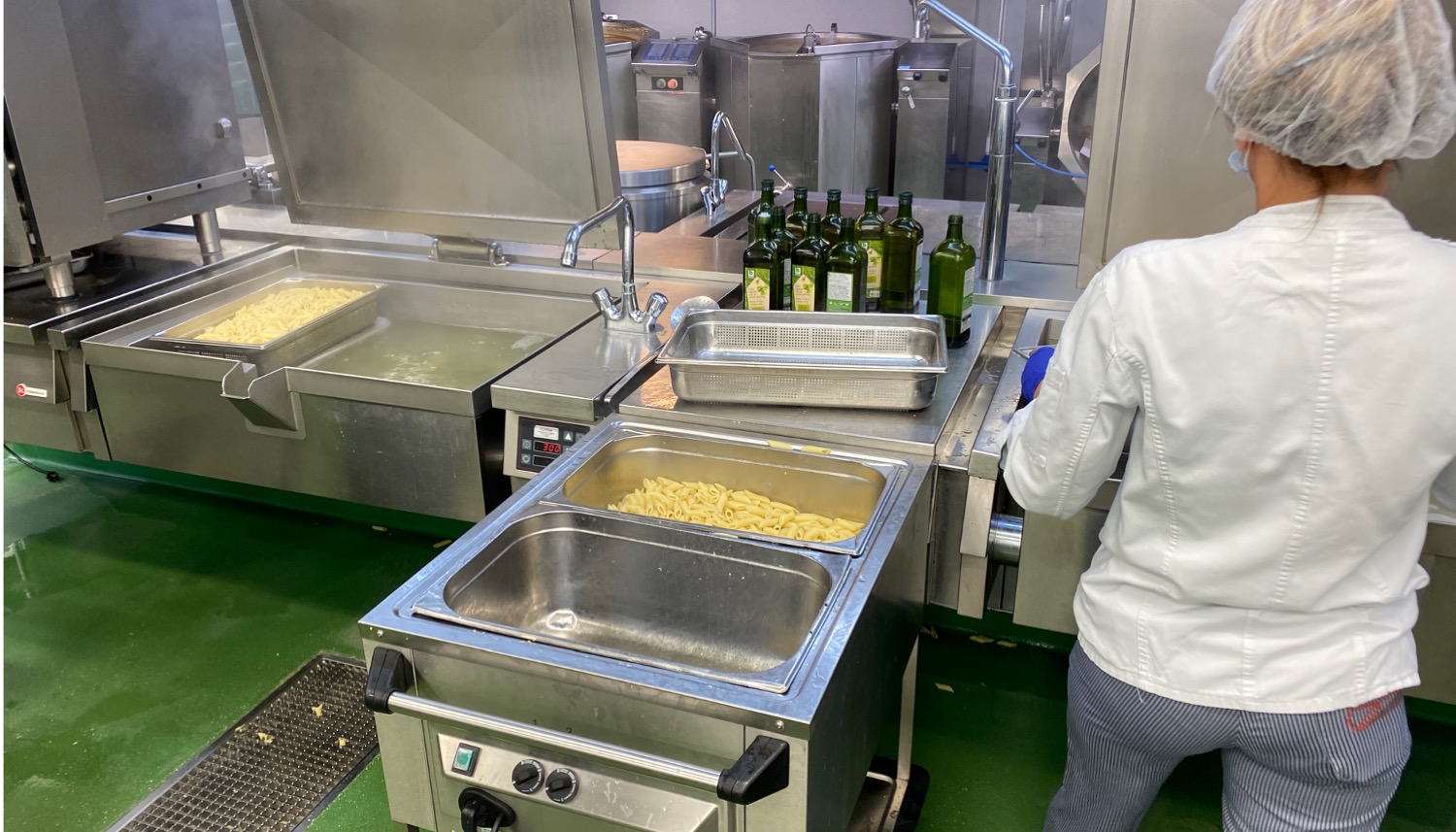
ISoSL inter-municipal association central kitchen preparing 12,000 meals per day (Photo credit, Strategic Design Scenarios).
Revolutioning food procurement processes
Agricultural issues are not always well understood by those who are not involved in the sector. That's why ISoSL systematically visits producers and farms when analysing offers. “We adapt our needs to what the region has to offer, rather than the other way round”. For Davide Arcadipane, it's a real paradigm shift when it comes to sourcing, moving towards fresh, seasonal produce, from short distribution channels and as raw as possible. Meeting producers is essential. It allows cooks and dieticians to understand the history of products and the diversity of local production.
The timing for change is also linked to ISoSL's purchasing policy: markets end and start at very specific times. The city's purchasing department has drawn up a schedule of contracts to be renewed, which are dealt with one after the other.
The work always starts with an inventory of requirements: what products for which usage? What quantities? How often? Etc. In short, all the information relevant to the preparation of meals, and therefore to the award of a new public tender.
The next step is to carry out research in the field to find out which local producers and businesses could meet these needs. It's important to know what's on offer so that you can draw up appropriate specifications. The offer, here, must be understood as the overall offer at a given moment, in a given territory and not as the submission of a bid by a tenderer.
Once ISoSL is certain that all the suppliers have a range of products that can be used to produce healthy, diversified menus, new selection criteria are incorporated into the public procurement tender. Public procurement legislation is not easy to use, and it is not always easy to find the right criteria. A multi-disciplinary team made up of the purchasing department and legal experts (both internal and external to ISoSL) is working on introducing criteria to ensure that products are environmentally friendly, respect animal welfare, are healthy and fair, and do not contribute to food waste. This is followed by a classic procedure involving the submission of tenders, culinary tests, appointment of the supplier, etc.
“On paper, it looks fairly simple to introduce sustainable products into community kitchens, but in reality it's rather complex and requires a lot of energy”, continues Davide. “There are logistical, human and financial obstacles, in particular the duality between the demand for low prices from canteen users and the need to offer remunerative prices to producers”.
Going beyond the canteen to tackle food waste
In Belgium, the ‘hot meal’ in the canteen often has a bad reputation. In fact, only a dozen percent of schoolchildren eat there. The others make do with their ‘sandwich box’ brought from home, which rarely contains a balanced, healthy and varied meal. Canteens are often noisy places where children eat in a hurry, without being accompanied or encouraged to taste. In Belgium, lunchtime is also considered ‘non-school time’. It is therefore a time not financed by the Wallonia-Brussels Federation in charge. As a result, the tendency is often to neglect these moments, to have the children looked after by ‘auxiliaries’, i.e, generally unqualified, untrained staff. The change in school canteens, while crucial, will affect and raise awareness in far fewer people than in other European countries where school canteens are mainstream. This is another reason not to stop there, to extend these policies to all collective catering and to develop general awareness.
The URBACT BioCanteens #2 Transfer Network played a key role in the development of an integrated local food approach in Liège, protecting both the health of citizens and the environment. Within the framework of BioCanteens, the ISoSL kitchens selected nine pilot schools from which an in-depth diagnosis of the lunchtime process was carried out. Within the framework of this diagnosis, particular attention was paid to the reduction of waste. “The observation phase made it possible to point out three critical moments where this waste was visually present”, explains Julien Chapaux, in charge of conducting the first diagnosis for Liège, “during production and cooking of meals, during the packaging and distribution from the central kitchen and during consumption in the schools.”
First, during production, daily variations in meal orders range from 100–350 meals. To avoid running out of meals during packing and serving in the schools, the cooks had taken to systematically producing more. Every day, the kitchen therefore provided for a safety margin, which inevitably led to waste during production.
Second, when the meals are put into the insulated containers to be sent to the schools (hot link distribution), the staff have a very short time to pack the 2,500 meals for the 150 schools. Observations have shown that the staff do not always have the same rigour at the beginning of the packaging line as at the end. This led to differences in the weight of the food in the insulated containers for the first schools served and those on the last round.
Finally, during the consumption of the meal, it was observed that there was generally too much (or sometimes not enough) food in the insulated containers, but above all that many children did not finish their plates.
In February 2022, Liège implemented a series of production, packaging and consumption weightings. A student carried out eight weeks of analysis (one week per school). It was measured that the overall waste of meals was 51%. For soup, the figure was 57%. These dramatic outcomes confirmed the first batch of observations with quantitative figures convincing ISoSL and all city canteens’ schemes to take action. A series of measures were taken: application of meal ordering with strict ordering deadlines, weighing at the packaging line, awareness-raising in schools, etc.
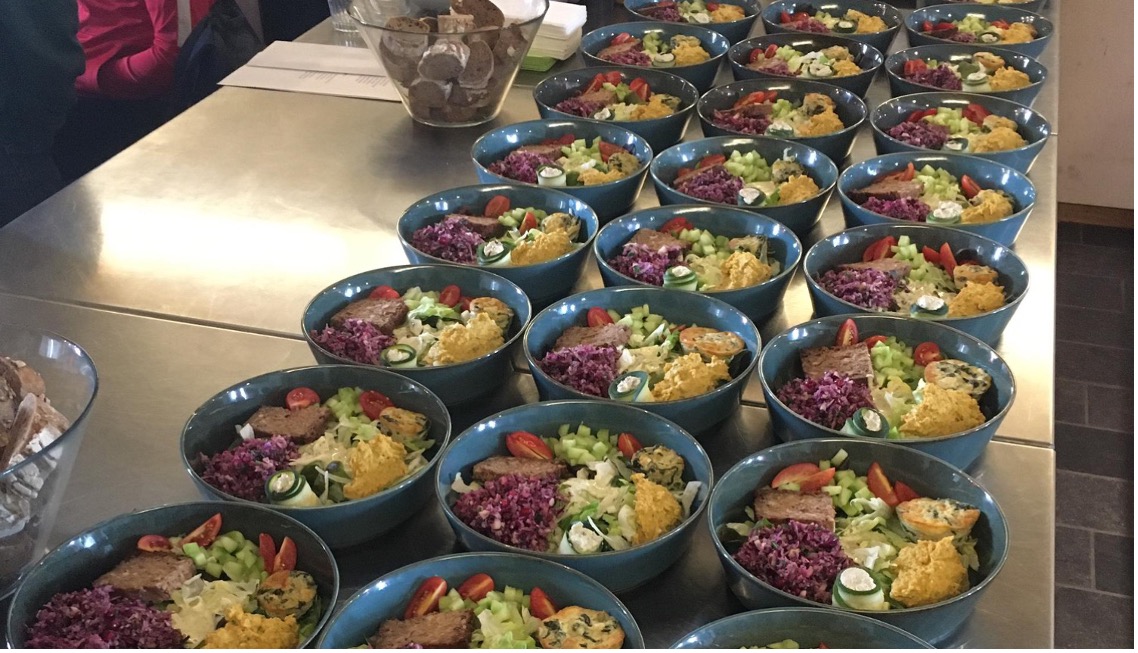
More sustainable and healthy meal at the canteen (photo credit: MAdil).
When a bottom-up movement meets city governance
Thinking about the market in a sustainable way is a complex process. It's not enough to change one criterion or another, or to demand more local, high-quality food. The key to making these changes is co-construction and a shared determination to achieve them, the involvement of all the players. “ISoSL and the city of Liège would not have been able to put all this in place without the Ceinture Alimentaire Terre Liégeoise”, states Vérionique Biquet, Project Manager for Healthy and sustainable food for all within the Social Cohesion Plan of Liège. “As public players, we don't have the capacity to mobilise the local ecosystem of producers without the support of local experts and facilitators”.
The Liège Food Belt (Ceinture Alimentaire Terre Liégeoise) emerged from more than 400 stakeholders in the region, who joined forces about 14 years ago. There was a need for a platform to support and structure this mobilisation among producers, market gardeners, organic groceries, sustainable canteens and restaurants. The rapid change achieved by ISoSL and Liège has been highly facilitated by the existence of a strong and large network of engaged stakeholders.
The tighter collaboration between the Liège Food Belt and the public authorities of Liège generates a booming dynamic within the local healthy and sustainable food ecosystem. In parallel to the transformation of school canteens, a large range of initiatives have popped up in recent years, involving various organisations and institutions.
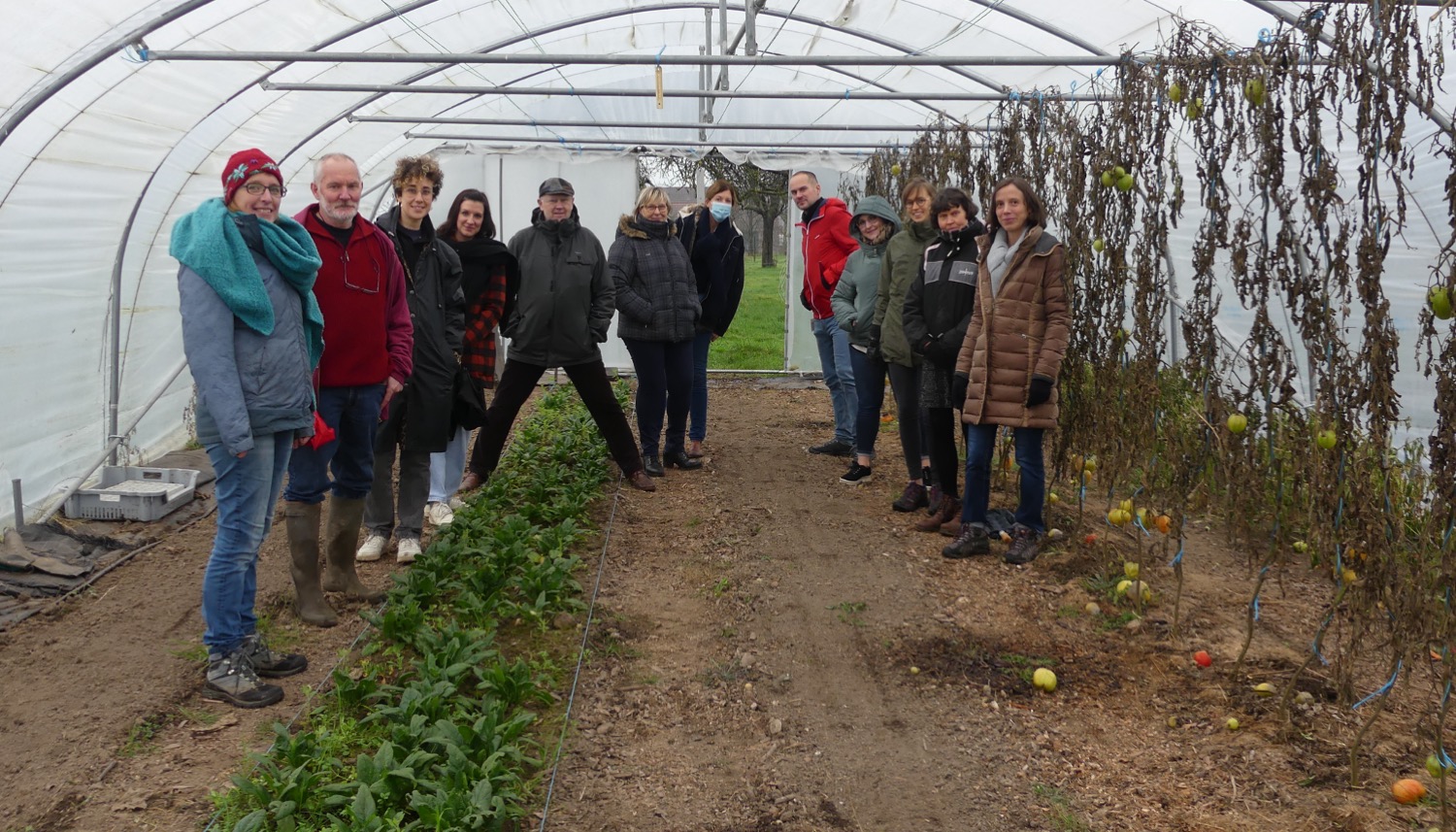
Visit to a local sustainable food producer (Photo credit: MAdil).
The MAdil, Maison de l'Alimentation durable et inclusive de Liège (Sustainable and Inclusive Food House) provides the opportunity to discover, test and learn about good food practices, including environmental protection and the fight against food waste. Activities cover culinary workshops, guest tables, walks around edible wild plants, meetings with local producers, introductions to market gardening techniques, and more.
HORIZON, a logistics centre dedicated to short circuits, has been operational for a year at the Marché Matinal de Liège in Droixhe, with storage space for local coopératives in particular to supply community kitchens. The "Short-Circuit" weekly market welcomes around 20 local producers and over 1,000 visitors every Thursday, from May to October, in the Place Cathédrale.
The CREaFARM programme, which makes public land available free of charge for local and urban agricultural projects. The agricultural plots are farmed by market gardeners on the principle of Community Supported Agriculture.
The creation of the CPA, Conseil de Politique Alimentaire (Food Policy Council) as a consultation and coordination body is also notable. It is dedicated to the actors of the food system, on the scale of the 24 municipalities of Liège Métropole and is composed of six Working Groups.
And last but not least, a month ago, construction began on a vegetable and canning factory, financed by European funds and planned as part of the national plan for recovery and resilience. This new installation will be active in 2025 and enable the supply of local and fresh vegetables to the ISoSL kitchen and beyond.
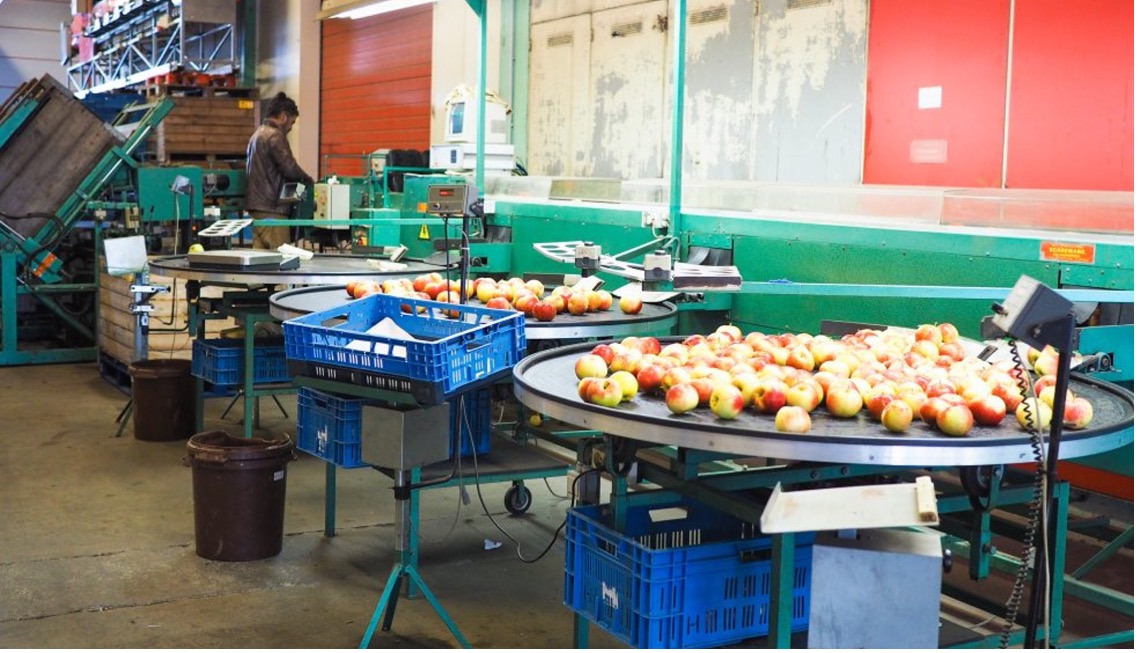
Logistics hub for local producers at the historic Droixhe morning bulk market (photo credit: Ville de Liège).
Good practices: from city to city
To reiterate, the BioCanteens Transfer Network played an important role in catalysing this process in Liège. In fact, Liège was engaged in a process of adapting the city of Mouans-Sartoux‘s Good Practice with its means and context: a daily distribution of 100% organic meals made of local products; a drastic reduction of food waste; the organisation of educational activities dedicated to raising children’s awareness of sustainable food, etc.
“In Mouans-Sartoux, the city started to take action towards more healthy and sustainable food and the citizens and the civil society joined the movement. In Liège it is the other way around, the Liège Food Belt kicked off the food transition process and the city administration built on it to set its healthy and sustainable food governance!” summarises Gilles Pérole, Vice-Mayor of Mouans-Sartoux in charge of Children, Education and Food and Coordinator of the BioCanteens URBACT Transfer Network.
Does this success mean that Liège is starting its own URBACT Transfer Network at regional level? “In a way yes”, answers Davide Arcadipane. “What we achieved here is possible on every Belgian territory. More initiatives from other cities such as Liège will produce more transition to sustainable practice of food producers, more potential to foster change through strategic public procurement even with the declining purchasing power due to inflation, more involvement and coherence in terms of food-related policies between local, regional, federal and European governance levels”.
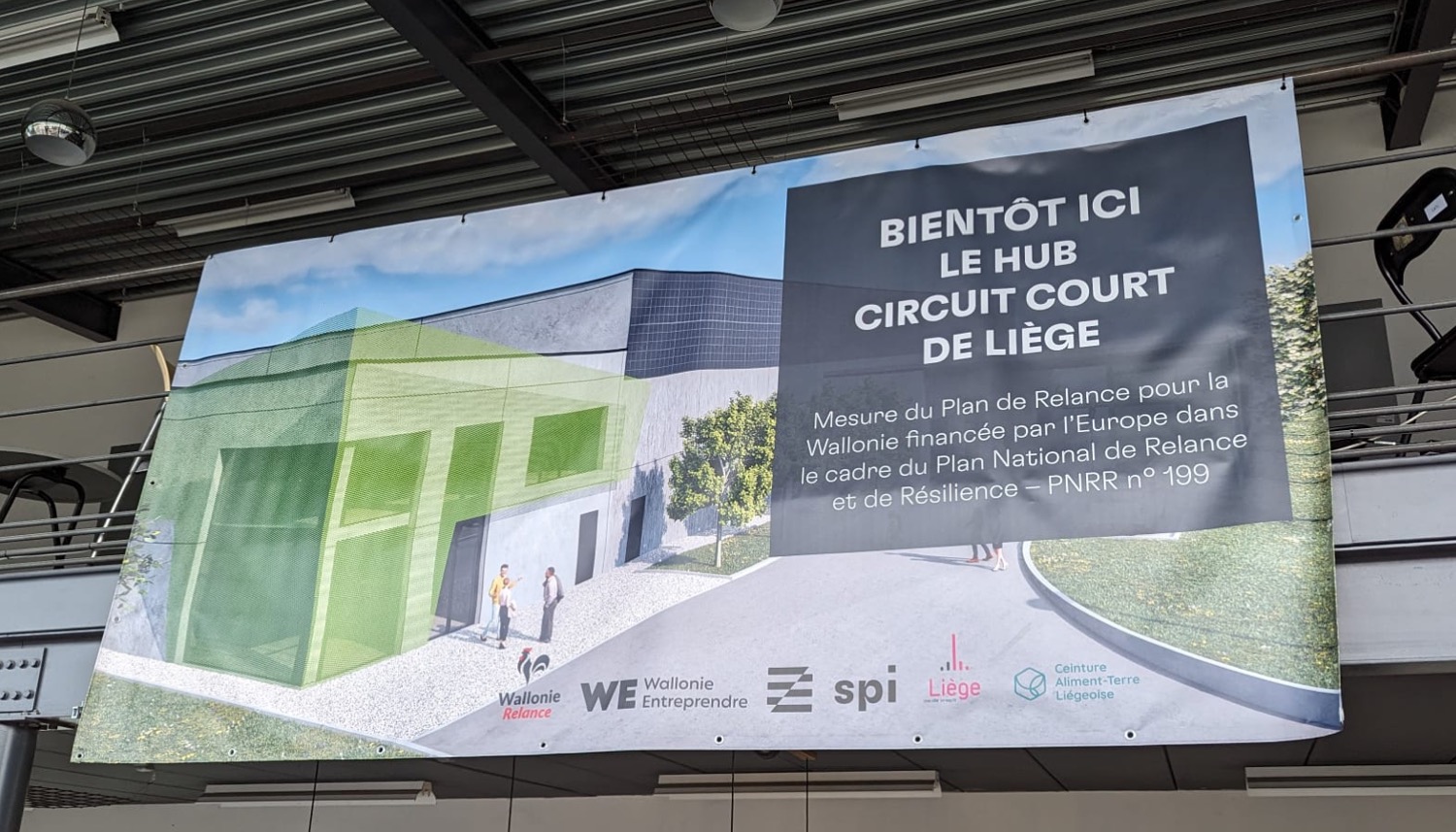
New short circuit logistic hub programmed for 2025 (Photo credit is Gaetan Wijnants).
Next steps for Liège
A lot has been achieved in a relatively short time to transform the ISoSL central kitchen. What are the next challenges for the city? The central kitchen started to cook two fresh local vegetables per day. The new vegetable and canning factory will be able to process 1,400 tonnes of locally produced vegetables per year and cover more than the needs of ISoSL. This vegetable factory will achieve the initial objective of 100% organic, announced in 2021 upon entering the URBACT BioCanteens Transfer Network.
The strategic use of the city purchase power. In 2023, Liège school canteens represented around €1,000,0000 of which €600,000 are already classified as ‘sustainable food’. This shows, if still needed, that strategic public procurement has an important stimulation effect on the emergence of new sustainable food producers and on the transition of the local farming ecosystem.
The 4,000 meals per day provided to the schools and nurseries should now be extended to 12,000 meals per day, including hospitals and elderly homes of the area. There is a strong political interest, including from other Wallonian cities. Moreover, a study is in progress to assess real costs which is to say, costs of delivering sustainable and local meals, but also taking into account hidden costs for public authorities due to unhealthy diets, diffusion of related diseases such as obesity, etc.
EU City Labs: what’s next on the menu?
The creation of a rich and articulated ecosystem is key to support changes in practices: it is true to ensure the evolution of citizens towards more healthy and sustainable diet. This was analysed in the recent article ‘Feeding change: Cities empowering healthier and more sustainable food choices’ as well as during EU Food City Lab on Changing Habits for a Healthy and Sustainable Food System (Mouans-Sartoux (FR), 21-22 March 2024). Liège example shows, if still needed, that it is also true for stakeholder practices change (farmers, transformers, cooks, canteens staff, etc.).
From 29-30 May 2024, Liège will host the EU City Lab on Public Procurement for More Local, Seasonal and Sustainable Food. EU City Labs are knowledge-sharing events co-hosted by URBACT and the European Urban Initiative. The Liège edition is the second of three events taking place in different cities, focused on change of eating habits, food procurement and preservation of agricultural land, and other elements for cultivating thriving local food systems in urban areas.
Interested in meeting with other cities, representatives and organisations working on this issue? Registration for the next EU City Lab is still open. Consult the full programme and register here.
Want to read more from URBACT experts on food and related topics? Visit the URBACT Food Knowledge Hub.
¹ The ISoSL uses the definition of ‘sustainable food’ found in the Wallonia Region Food Strategy Manger Demain (Eating Tomorrow) and that of the FAO.

